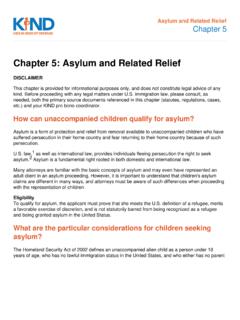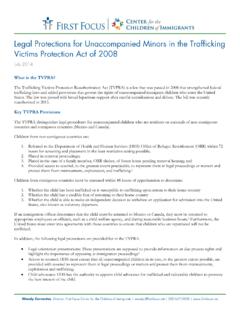Transcription of Chapter 4: Special Immigrant Juvenile Status (SIJS) - KIND
1 Special Immigrant Juvenile Status ( sijs ). Chapter 4. Chapter 4: Special Immigrant Juvenile Status ( sijs ). DISCLAIMER. This Chapter is provided for informational purposes only, and does not constitute legal advice of any kind. Before proceeding with any legal matters under immigration law, please consult, as needed, both the primary source documents referenced in this Chapter (statutes, regulations, cases, etc.) and your KIND pro bono coordinator. Introduction Special Immigrant Juvenile Status ( sijs ) allows Immigrant children in the state Juvenile system who cannot reunify with their parents due to abuse, abandonment or neglect, and who meet certain other criteria, to obtain lawful permanent immigration sijs is unique among immigration remedies because a state court order is a prerequisite to filing for the sijs -based I-360 petition with the immigration service ( Citizenship and Immigration Services (USCIS).)
2 What is Special Immigrant Juvenile Status ? Special Immigrant Juvenile Status ( sijs ) is unique among immigration remedies in that the application process requires the involvement of a state " Juvenile court." Whereas applicants for other immigration remedies proceed solely before federal immigration authorities, a child seeking sijs . must first ask an appropriate state court judge in the state where the child is living to make certain findings. These findings involve determinations that, among other things, reunification with one or both parents is not viable for the child due to abuse, neglect, abandonment or similar grounds under state law. The involvement of state court in the sijs process reflects Congress' judgment that an appropriate state court is best suited to make findings relating to family law or child protection - matters that lie within the state court's traditional expertise.
3 A child may not proceed to file her sijs petition with USCIS until she first obtains an sijs predicate Special Immigrant Juvenile Status ( sijs ). Chapter 4. order from an appropriate state Juvenile court. The state court is not being asked to grant a child lawful immigration Status ; that responsibility lies solely with USCIS. The state court's role in the sijs . process is simply to make the factual determinations necessary for sijs eligibility. Once this takes place and a sijs predicate order is entered that includes these specific determinations, the child may proceed with the immigration phase of the case by submitting the sijs petition to USCIS. Upon the adjudication and receipt of an approved sijs petition (I-360) from USCIS, the last step is for the child to file an application for adjustment of Status (I-485) to lawful permanent resident of the United States.
4 Why are state court decisions necessary for an immigration application? The involvement of state court in the sijs process reflects Congress' judgment that an appropriate state court is best suited to make findings relating to family law or child protection - matters that lie within the state court's traditional expertise. What is required in the state court order? An appropriate state court judge in the state where the child is living is required to make certain findings involving determinations that, among other things, reunification with one or both parents is not viable for the child due to abuse, neglect, abandonment, or similar grounds under state law. The state court judge includes these requisite findings in an order - referred to as the " sijs predicate order.". What is considered a " Juvenile court"?
5 The sijs regulations define " Juvenile court" as "a court located in the United States having jurisdiction under State law to make judicial determinations about the custody and care of juveniles."2 In many states, this means a traditional Juvenile court, a family court, or the family division of a court of general jurisdiction. In some states, multiple courts share such jurisdiction and a probate court or surrogate court may be a " Juvenile court" for immigration purposes. Are state court judges deciding to grant a child lawful 1300 L St. NW Suite 1100 Page 2 202-824-8680. Washington, DC 20005 Copyright KIND. Special Immigrant Juvenile Status ( sijs ). Chapter 4. immigration Status ? No. The state court is not being asked to grant a child lawful immigration Status ; that responsibility lies solely with USCIS.
6 The state court's role in the sijs process is simply to make the factual determinations necessary for sijs eligibility. Once this takes place and an sijs predicate order is entered that includes these specific determinations, the child may proceed with the immigration phase of her case. Who is a Special Immigrant Juvenile ? The INA defines a Special Immigrant Juvenile as a person who has been declared dependent on a Juvenile court or who has been placed in the custody of an agency or individual because one or both of the child's parents are not able to care for the child due to abuse, neglect, abandonment, or a similar basis under state The child must continue to be dependent on care from the Juvenile court. In addition, the child must show that the Juvenile court determined it would not be in the child's best interest to be returned to the child's country of Also, the child must be under the age of 21, in the United States,5 and remain unmarried6 throughout the immigration process to qualify as a Special Immigrant Juvenile .
7 Finally, the child cannot have committed certain crimes, such as crimes of moral turpitude or drug offenses, and cannot be otherwise inadmissible to the United States. Child Practice Pointer: If the child gets married before her I-360 is approved, the I-360 must be denied. If she gets married after the I-360 is approved but before the I-485 is granted, the I-360 will be revoked and thus the underlying basis for the I-485, the adjustment of Status to legal permanent resident, will be lost. How is abuse, abandonment, neglect, or a "similar basis". determined? The sijs statute requires a factual determination of abuse, abandonment, or neglect, or similar basis under state law. The sijs regulations do not define these terms, and so you will have to consult the relevant state laws for guidance on what constitutes abuse, neglect, or abandonment.
8 Further, the 2008 TVPRA provides an additional category, "similar basis under state law" that gives more latitude in states that use different terminology or recognize additional bases for foreclosing a child's reunification with parents. For example, there are situations in which a child may be mentally ill or physically incapacitated and the parent is unable to care for the child, but in which there was no 1300 L St. NW Suite 1100 Page 3 202-824-8680. Washington, DC 20005 Copyright KIND. Special Immigrant Juvenile Status ( sijs ). Chapter 4. actual abuse, abandonment, or neglect. Child Practice Pointer: It is important to note that while a determination of abuse, abandonment, or neglect, or similar basis under state law individually will suffice, it is wise to argue for as many of the findings as you can support.
9 What does it mean to be declared dependent on a Juvenile court or placed in custody? A Juvenile judge cannot make the requisite sijs findings until a child is first declared dependent on the Juvenile court. As set forth in the sijs regulations, the declaration shall be "in accordance with state law governing such declarations of dependency."7 Of all the aspects of sijs eligibility that are determined under state law, this element probably entails the most variation among states or within them. It is important to understand that the above requirement does not limit sijs eligibility to children who are financially dependent on the state or in state custody. In fact, there are a number of scenarios that will qualify under this element. One of the more common circumstances in which a child is declared dependent on the Juvenile court include when she is placed into state foster care.
10 However, sijs . eligibility can also be established in cases that do not fit the more "typical" models. For example, it can include the situation of a child in Juvenile delinquency proceedings who has been placed under the state probation department. It can also include the situation where a responsible adult is made the guardian or custodian of the Child Practice Pointer: The sijs predicate order must contain language stating that a child is dependent on the If the judge you appear before is unwilling to state that the child is "dependent on the court," request that the court write "the child is dependent upon the court in that the child's parents have relinquished control over him or her and the court has accepted jurisdiction over the child's custody.". Practice Pointer: You should contact your KIND pro bono coordinator for specific guidance on relevant state law.



